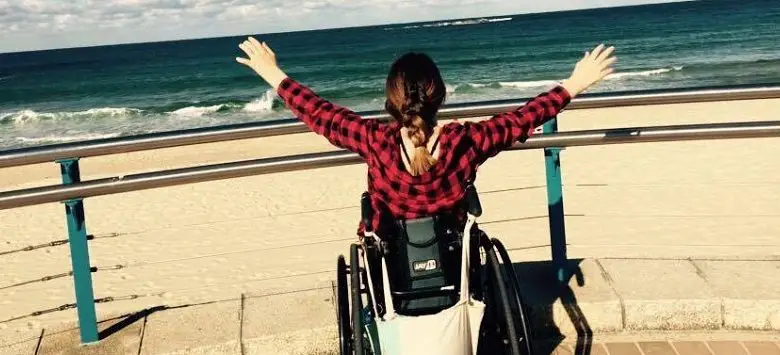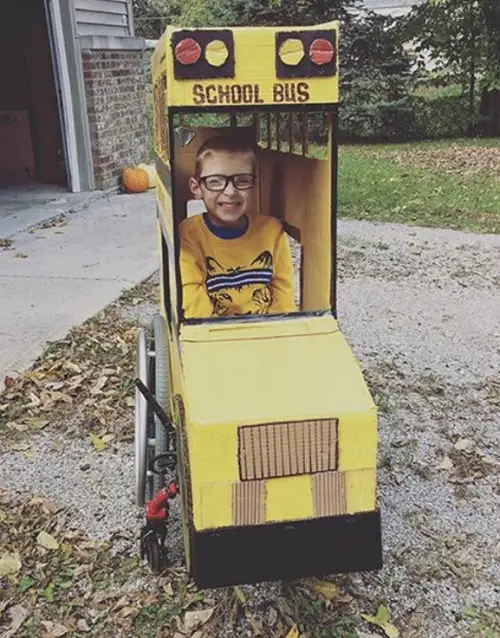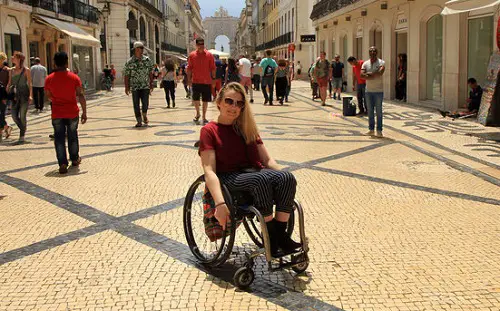
Let’s change the way we talk about disability
Do you hate the term ‘wheelchair-bound’? What does it portray and mean to you? Our deputy editor Shannon, who uses a wheelchair, shares her blog post on why she thinks we need to change the way we talk about disability.
Last month I came across an article titled ‘wheelchair-bound boy gets custom Halloween costume‘. When I first read it, I was annoyed by two things.
Firstly, none of my Halloween costumes were this amazing when I was a kid. I mean… I was the tooth fairy one year, which was pretty creative, but it did not make the news. Umm hello, dad, what do you have to say about that?


Secondly, and most importantly, ‘wheelchair-bound’ is not a way that I or many members of the disability community want to be described. And, sadly, this isn’t a one-off. There are plenty of other examples of publications using the term wheelchair-bound.
I am not wheelchair-bound
If you come across an article about someone in a wheelchair, chances are ‘wheelchair-bound’ is in the title. It is outdated and degrading. It makes me think of a helpless individual in a wheelchair who stares out the window all day. Can you tell I’m not a fan of the term?! I am not ‘bound’ to my wheelchair. In fact, I am sitting on the couch using my wheelchair as a footrest as I type.
Society has placed such negative connotations on wheelchairs, making it seem as if they are the limiting factor in the equation, when actually it’s the opposite.
My wheelchair is my freedom.
It allows me to get out of bed in the morning. It enables me to move through the world in a dignified way. Without it, I would be unable to leave my house, go to work, get my eyebrows done or travel the world. Without it, I would be lost. According to the Wheelchair Foundation, this is a reality for millions of people globally who do not have access to a wheelchair.
Don’t get me wrong, being a wheelchair user comes with a number of frustrations. I wish my chair was 10 pounds lighter and didn’t squeak like a mouse at times. But I am very fortunate for what it allows me to do. I use a wheelchair and that is not something I can change.
What we CAN change is society’s portrayal and perception of people with disabilities.
Let’s give it a try…. shall we? So, instead of: “A wheelchair-bound girl, Shannon Kelly, travelled to six countries in one summer.” Let’s say: “World traveller, Shannon Kelly, visited six countries this summer in her wheelchair.”
The second sentence makes the story less about the wheelchair, and more about me. There are many more interesting things about me besides the fact that I’m a wheelchair user.
I’ll name a few:
- I love the earth… who wants to go to an earthship eco-night with me?
- I’m currently trying to convince my mom to let us have chickens in the backyard (it’s not going well).
- I will always support politician Bernie Sanders and even tried to name our dog after him.
- If my eyebrows are not done, chances are I’m not having a good day.
- Chinese restaurant Panda Express is my guilty pleasure.
Making society more inclusive


Besides using more positive language when describing wheelchair users, we also have a lot of work to do in order to make society more inclusive. Improving accessibility will go a long way in helping people with disabilities be seen as capable and independent individuals.
We deserve equal access to things such as:
- Public transportation. I live in Chicago and, currently, only 70% of Chicago’s CTA trains are accessible. The city does have a plan to make them all accessible, but over a 20-year period.
- Housing options. There are accessible housing options in Chicago, but they are normally newly constructed, high rises that are extremely pricey. We deserve affordable housing that meets our needs.
- Employment opportunities. While the Americans with Disabilities Act prohibits companies from discriminating against applicants requesting reasonable accommodations, there is a very high unemployment rate among people with disabilities. The U.S. Bureau of Labor Statistics says that; “18.7% of persons with a disability were employed, and in contrast, the employment-population ratio for those without a disability was 65.7%.”
- And of course… social activities. I’ve faced many barriers when it comes to attending sporting events, concerts and even visiting local bars. Being social and doing fun things is important. People with disabilities should not be excluded from this aspect of life.
Changing the face of disability in society is a pretty big undertaking. But luckily, I don’t have to do it alone. The wheelchair community is united when it comes to this issue and is determined to show people what we are capable of.
Earlier this year, the Rollettes, a wheelchair dance team launched their Be Boundless campaign to celebrate our strengths as a community and to show the world we are not wheelchair-bound. Hundreds of people shared their stories on social media with the hashtag #BeBoundless18.
And, of course, Disability Horizons is here to do the same. To show how our community of readers can achieve so much. Together, we can tear down verbal and physical barriers.
If you’ve made it this far, thank you for reading! Please take what you’ve read and be an ally in helping people with disabilities thrive in society. Be mindful about the language you use to talk about disability in order to help us change our narrative into a more positive one.
Enjoy some photos of me living my best, boundless life 🙂


By Shannon Kelly – visit Shannon’s blog to read more of her posts
What do you think of the term ‘wheelchair-bound’? Join the conversation by leaving your comments below, messaging us on Facebook or tweeting us @DHorizons.
More on Disability Horizons…
I agree I absolutely hate the term wheelchair-bound.
To me it means that the wheelchair is a very negative thing, almost like I’m shackled to it, can never get out of it.
According to the Oxford Thesaurus comparable terms to bound are: tied, tied up, roped, tethered, chained, fettered, shackled, hobbled, secured in irons, in chains.
The Cambridge Dictionary described the prefix -bound as: preventing leaving (causing people to be) unable to leave a place/ situation because of an unwanted condition.
Both of these descriptions are so negative, pessimistic, defeatist, gloomy and bleak. That is not the way that I think of my chair and what it does for me.
I’m not going to lie, if I could turn back time and erase the illness that caused me to be in my chair then I most definitely would but I can’t do that so I have to make the best of what I now have.
There was a period of time (about 7 months) when I couldn’t transfer into my chair so spent all my time in bed and everything had to happen in my bed. (A hoist wouldn’t fir into my bedroom) The only time I got out of bed was when ambulance men slid me from bed to stretcher for hospital appointments of which there were 3, I left my bed 3 times in seven months and during that time all the words above describing bound I felt at one time or another. The day I was able to transfer into my chair I felt the shackles, chains, ties etc break and I felt free.
Being in my wheelchair is just that freedom, freedom to move about, be independent, get out and about. Freedom to be me.
My heart goes out to you, I have for sometime wanted to start a transport Co for disabled people, this would be a door to door service utilising electric vehicles and could be used for any purpose (that’s legal ). If you are interested in helping me please contact me initially on the e-mail address or on the phone 07970 979 646, Martin